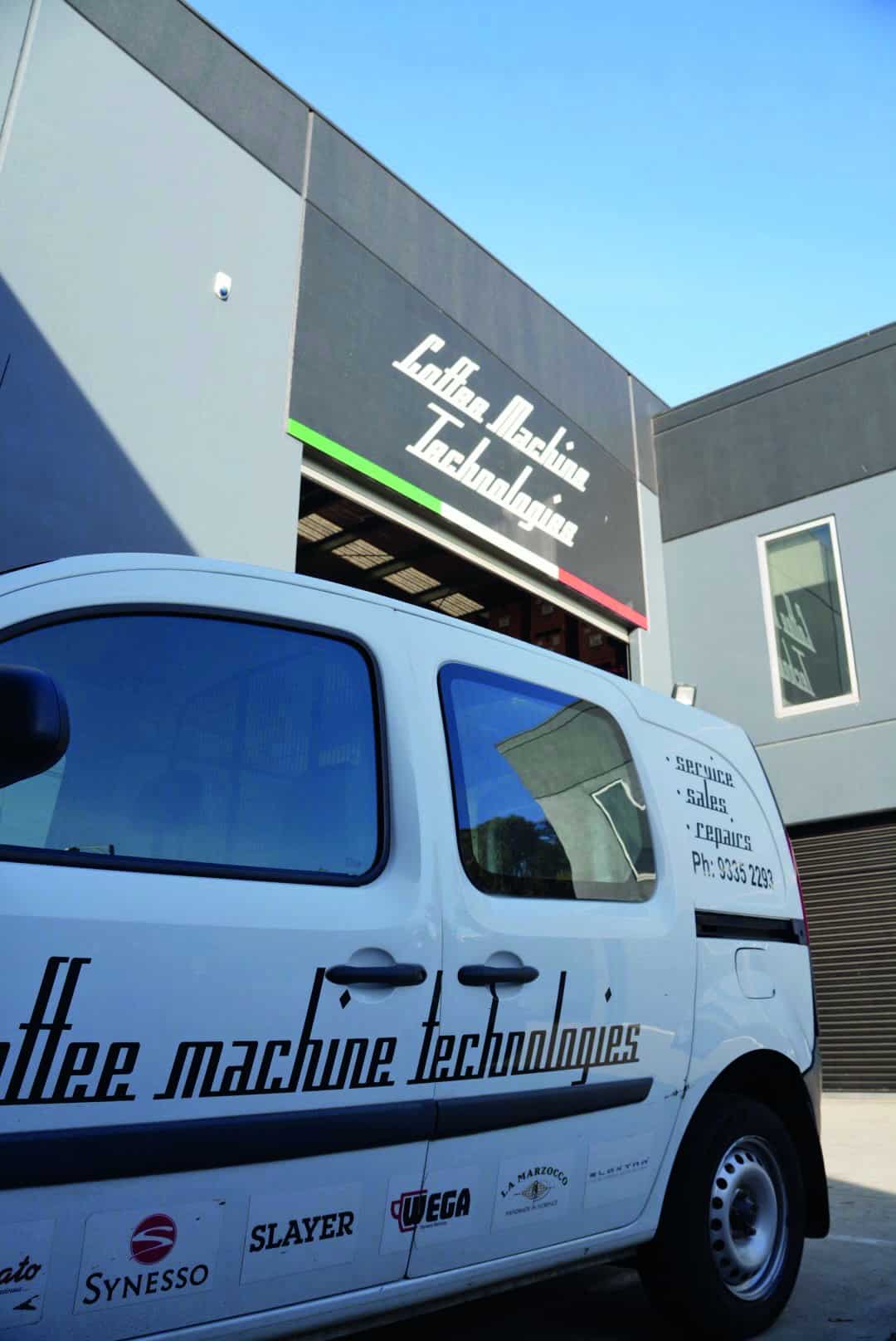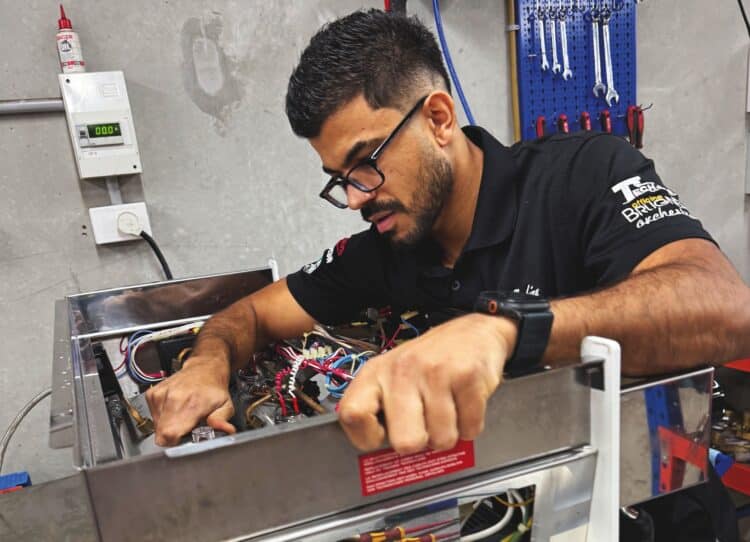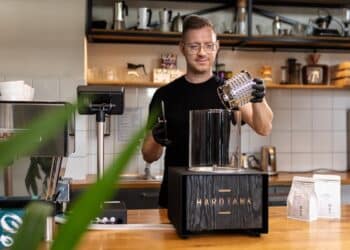There’s a group of skilled individuals quietly keeping the cogs of Australia’s coffee industry turning. Coffee Machine Technologies Founder John Colangeli spotlights the work of technicians and the need for new talent in the workforce.
With world championships celebrating the best in the industry and some influential individuals becoming social media stars with followers in the hundreds of thousands, baristas are often the poster people of the coffee sector. Roasters, too, are regularly revered for their efforts with accolades and industry clout.
However, there are many other individuals without whom Australia’s café scene couldn’t continue to function – perhaps most important of all are the technicians who keep the equipment running smoothly on which these roasters and baristas work to create their award-winning blends and world-class latte art.
As Founder of Coffee Machine Technologies, one of the country’s leading coffee equipment and servicing providers, John Colangeli knows how vital these technicians are.
“Technicians are the unsung heroes of the coffee industry. At Coffee Machine Technologies, we have a team of 12 technicians and receive about 40 to 50 servicing jobs in Melbourne each day, but that can shoot up to 80 at busy times,” says John.
“Even with all the advancements in technology, there’s no espresso machine or grinder out there that’s unbreakable, so at some point it will need to be fixed. If that happens at peak rush hour, a technician will be the difference between the café being able to get up and operating again or potentially not serving coffee.”
Back to school
The pressure to get these machines back up and running is a feeling John knows well. Training as an electronic technician in the weighing industry, a long-held interest in espresso machines and family visits to Italy throughout his childhood initially led him into the coffee industry where he worked as a technician for a coffee company in Melbourne.
After six years, he left to explore new opportunities, but it wasn’t long until the calls started coming from former clients whose machines he’d fixed previously.
“I had no intention to start my own company, but the calls kept coming. Within 12 months I had brought on a few technicians to help and in 2004 I formally established Coffee Machine Technologies,” he says.
While over the past 20 years the role of the technician has evolved, John says most of the core skills required of the job are still essential. Many of the people who keep coffee machines across the country running today have moved over from other industries, such as electrical, mechanical, and aircraft engineering, and there are very few formal courses available for young people to learn the trade.
“For me, having the knowledge of electronics from my apprenticeship has helped enormously. As espresso machines have advanced, the electronics they use has increased and become more complicated, so I’ve been able to share my experience to train up our team,” John says.
“There are no coffee-specific courses or education budding technicians can do – it’s up to me as a business owner to provide the training. It takes around 12 to 24 months to fully train a new technician, depending on their industry experience. Around 90 per cent of my time is spent in the workshop and there’s not a day that goes by that we don’t touch on something that’s relevant to the industry. The learning never stops.”
Influencing future tech
As Coffee Machine Technologies grew, as well as providing servicing, the company also became a major supplier of equipment, acting as the regional distributor for some of Europe’s biggest manufacturers. With in-depth knowledge of the local café industry and the idiosyncrasies of Australian coffee culture, John and his team also advise companies on how their technology can be adapted to the market here.
“Servicing and repairs are a huge part of our technicians’ day-to-day role, but we also test equipment before it goes to market and look for ways it can be improved to suit the needs of Australia’s cafés,” John says.
“There are some manufacturers for which we’ve been the exclusive distributor for more than 15 years and there’s a huge level of trust in these relationships.”
Many of the manufacturers Coffee Machine Technologies works with are based in Italy, where coffee is widely enjoyed as espresso and without milk. Many of the team’s suggestions are based on adapting the equipment for Australia’s coffee drinkers who are much more milk dominant.

Aircraft to coffee craft
For Mick Denning, one of the technicians at Coffee Machine Technologies, the diversity of the job is something that drew him to the role. With experience as an aircraft engineer and then a barista, his unique mix of skills set him on the path to being a technician.
“Obviously there are huge differences between an aircraft and a coffee machine, but I’d say one of the biggest differences working in the coffee industry is that you’re communicating with the café owner or manager almost the whole time you’re working on the machine,” he says.
“What I like most about the job is that no two days are the same. Each day you’re at a different venue working on a different machine, and my job is to problem solve and get the equipment back up and running as quickly as possible.”
One of the biggest challenges of the role, according to Mick, is the huge variety of equipment and the constant updates in technology. He’s not just working on espresso machines but also grinders, automated milk steamers, tamping technology, and more.
“Adapting to new technology and getting to know new equipment can be challenging, especially with the rise of automation,” he says. “John does a great job of introducing us to new products and there’s a lot of in-house training to make sure we’re all familiar with what we’re working on.”
What café operators can do
Both John and Mick say there are some simple steps café operators can take to ensure they see as little of the technicians as possible and keep their venues running smoothly. Keeping equipment clean and well maintained can not only keep the technicians away but also make their job much more straightforward when required.
“Something as simple as not back flushing frequently can lead to problems such as issues with group valves. There are quite a few small problems that are brought about by lack of cleaning” says Mick.
“If an operator can keep their machine as clean as possible, it also makes our job easier when we come to fix or service the equipment. We’re also happy to advise on how best to keep the machine in good shape.”
John also highlights the importance of flagging small concerns before they become big issues.
“A small leak can develop in a larger leak, and that can cause damage to other parts of the machine. It’s always best to flag these small things early so we can get them sorted before they cause any real damage,” he says.
While Coffee Machine Technologies’ team of technicians continues to grow with the business, John admits he’s unsure about the future of the role.
“There are fewer people coming into the role than there were 40 years ago because younger generations are less likely to be pursuing hands-on jobs in these sorts of industries,” he says.
“When I was a child, we spent our time outdoors building billy carts and modifying bikes. We had to build things for our entertainment, whereas now that’s not often the case. I’m not saying there aren’t people out there with the ability to become great technicians, but I wonder where they’ll get the hands-on practical experience when there are few educational pathways into the profession.”
“Technicians are essential to the Australian coffee industry. The work they do is amazing and without them the sector wouldn’t be able to function.”
For more information, visit coffeemachinetechnologies.com.au
This article appears in the August 2025 edition of BeanScene. Subscribe HERE.




